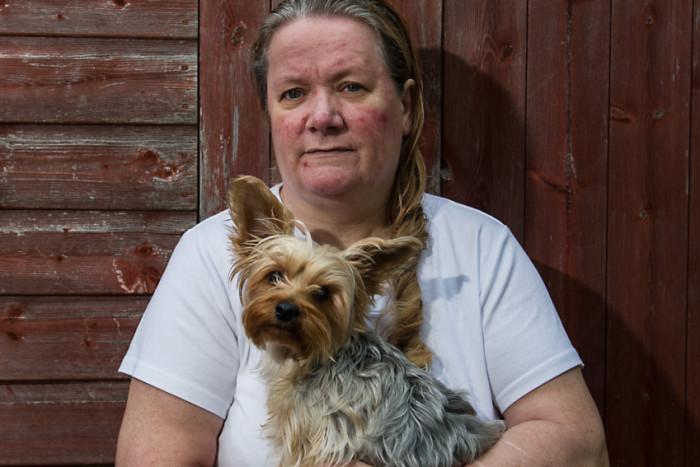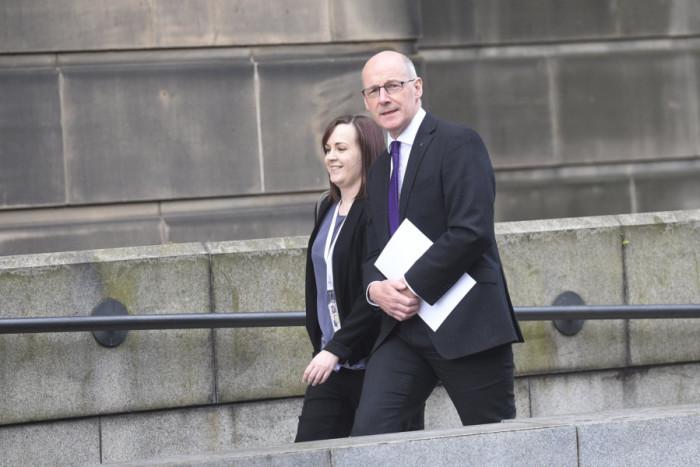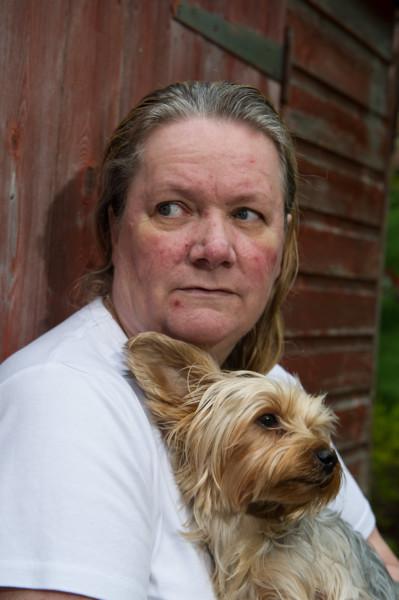|
Insight: Victim feels let down by child abuse inquiry
By Dani Garavelli
When Helen Holland talks about the abuse she suffered at the hands of nuns and priests at Nazareth House in Kilmarnock it is as if she has been transported back into her childhood. She may be sitting serenely in her home in Dunbartonshire – her long hair twisted in a Rapunzel coil, her two Yorkshire Terriers dozing in her lap – but the pain of what happened to her and the way it made her feel – unwanted, unloved, unworthy – has not been blunted by the passage of time. Half a century later, she is still plagued by night terrors which send her screaming into the street. And everyday encounters trigger sudden panics. The sound of a nurse’s feet in a hospital corridor – like a nun’s steps across a dormitory – send her into meltdown; when a doctor carries out an examination, she can feel it on her skin for weeks afterwards. These are some of the legacies of Holland’s years in care. She knows the past cannot be erased, but she wants her suffering documented and publicly acknowledged. Although financial redress is important, what she craves most of all is validation. After so long being ignored, survivors across the country hoped the public inquiry into child abuse in care would provide that validation. Instead, the resignation of panel member Professor Michael Lamb and chair Susan O’Brien QC amidst allegations of Scottish Government “interference” has reinforced their feelings of worthlessness. “For a lot of us, setbacks like this reiterate what we were told as children: ‘No-one is interested, no-one cares, you are of no value to society,’” says Holland, 57, deputy chair of Incas (In Care Abuse Survivors). To understand the scale of the survivors’ frustration, consider the anguish over the Chilcot report, published 13 years after the Iraq War and seven years after it was commissioned. That length of time may seem obscene, but it is more than 50 years since Holland went into the home, nearly 20 years since the Nazareth House scandal was exposed and 12 years since then first minister Jack McConnell apologised to survivors (an apology he made “on behalf of the Scottish people” in order to protect ministers from legal action). Yet survivors still struggle to access support services and are nowhere nearer securing financial redress; and though there has been an apology on the part of the Catholic Church, there has been none on the part of the state. The decision to set up the Scottish Child Abuse Inquiry – in December 2014 – was a step forward. But even had it run smoothly, it was expected to last years. Instead, it has been beset by problems. It took six months for the Scottish Government to appoint O’Brien – a choice challenged by two religious orders – which meant the inquiry wasn’t up and running until October. As time dragged on, survivors’ groups, including Incas, complained about the lack of progress, the perceived lack of consultation and the remit, which includes those abused in care homes, boarding schools, borstals and foster care, but not those abused in day schools, parish churches or groups such as the Scouts. The current crisis erupted into the public domain 12 days ago when Lamb resigned citing interference by ministers. O’Brien’s resignation a week later on similar grounds raised further doubts over the inquiry’s independence from government. Heightening the survivors’ distress is a lack of clarity over events leading up to her departure. The Scottish Government says she was asked to go after she made “inappropriate comments” during a training session in February. But in her resignation letter, O’Brien insists threats to oust her were being made as early as January. There are reports that friction was caused by O’Brien’s desire to use junior counsel as opposed to in-house officials to take testimony. Education secretary John Swinney says junior counsel would have cost £100 an hour. At the centre of the controversy is child abuse expert Claire Fyvie, from the Rivers Centre for Traumatic Stress, which was funded to provide three months of support to those taking evidence. It was Fyvie who overheard O’Brien’s comments and reported them to ministers. Fyvie had been an SNP candidate in the North Lanarkshire council elections. The third panel member, Glenn Houston, chief executive of the Regulation and Quality Improvement Authority of Northern Ireland, who has not resigned, wrote a letter in support of O’Brien. At a meeting on Thursday, Swinney attempted to provide reassurance about the future and impartiality of the inquiry. But the survivors say there are still unanswered questions including: 1) If Fyvie found O’Brien’s comments so offensive why did she take several months to report them? And 2) if those comments were at the root of the Scottish Government’s concern, why weren’t survivors asked if they considered them inappropriate? (Holland and fellow Incas member, Ian McFadyen, do not). Whatever the precise circumstances, O’Brien’s resignation is a disaster. Although the 30-strong inquiry team can continue to take witness testimony without a chair, the first public hearings scheduled to take place in November have already been postponed. And no-one expects the search for a new chair to be quickly concluded. Though survivors groups have suggested several names – including Michael Mansfield QC, who represented the families in the Hillsborough Inquiry – they are well aware the prospect of taking on a role which has already been the focus of such acrimony may not be appealing. The fiasco is particularly damaging for frail victims whose chances of achieving any resolution are fading fast. Holland says she has lost count of the number of people who have died waiting for action. They include her own sister Margaret, who succumbed to cancer last year. As her life ebbed away, Holland recorded her testimony on dictaphone. She has been told she can submit the recording to the inquiry so Margaret’s voice will be heard, but she will never get to read the final report or see the state acknowledge its culpability. The greater the delay, the more people will be robbed of that opportunity. Holland’s own story demonstrates how abuse carried out in state and religious-run institutions has already robbed survivors of so much. On her phone, she has a black and white photograph: two girls – aged five and six – in smart coats standing in front of a statue of the Virgin Mary. The girls are Holland and another sister, Elisabeth, and the picture was taken outside Nazareth House just before her father, under pressure from the parish priest, handed the three of them over to the nuns. “Look at me smiling,” Holland says. “I had been well-cared for up until then. I had no idea what lay ahead.” This would be the last family photo taken until she was an adult; in the home the girls were split up and when it came time for her older sisters to leave, they were spirited away without so much as a goodbye. What happened to Holland in Nazareth House is horrific. Used to recounting it – to counsellors, academics, police officers and journalists – she speaks in an impassive tone, shot through with flashes of pure anguish. Holland tells, for instance, how, on her second night, scared and alone, she crawled into her sister’s bed only to be dragged out by her hair, hit with a bamboo cane and called a “brazen hussy”. She tells of depraved punishments such as being hit with a rod and shut in a pitch-black isolation room and told the devil was in beside her. Holland says her principal abuser – Sister Kevin, now dead – abused her both physically and sexually and, on a handful of occasions, held her down while priests raped her. But the thing she keeps coming back to is the way the nun’s constant insults reduced her to nothing. Several years after leaving Nazareth House, Holland herself joined the Missionaries of Charity. “I was told they worked with the homeless and destitute, people that nobody cares about, and I knew straight away that’s what I wanted to do,” she says. “Because I knew what it was like not to be loved. We were told every day: ‘That’s why you’re here. Nobody loves you. Nobody wants you.’” Throughout her life, Holland has struggled to cope with the repercussions of her abuse. In her 20s, after leaving the order, she felt she didn’t belong in the world and twice attempted suicide. Later she married and had two children, but a brief spell of happiness ended when her younger child died and her husband left her. As her mental health foundered, her older child, Kenneth, four, was taken into care. Later, she won him back and she now sees him every day. Over the years, Holland gradually disclosed some of what had happened to her to psychologists, but it wasn’t until 1998, when she heard workmates discussing a newspaper report of alleged abuse at a Nazareth House elsewhere in the country, that she finally went to the police. Feeling compelled to support the woman, whose claims were being called into question, she gave a series of statements on Sister Kevin. Eventually she was told no action would be taken – not because her story was disbelieved, but because the nun was too old and infirm to be prosecuted. “I felt sick then. I thought: ‘You still bring war criminals to court, so what’s the difference,’” she says. In common with many other survivors, she spent much of the next decade lobbying for action. Though politicians talk a good game, she says, they don’t really listen. Meanwhile, a cottage industry has been launched off the back of their suffering. “As children we were treated as financial commodities for the institutions,” says Holland. “Now, as adults, there are a lot of people whose careers are progressing at our expense: students doing PhDs on institutional abuse, charities which have been set up. It’s almost as if the whole thing has come full circle: we are back to being used as financial commodities. The government should be saying: ‘We need to look at the harm that’s been done and provide redress,’ not spending money left, right and centre to come back with answers we already have.” Though the decision to hold a public inquiry was welcomed, many survivors were dissatisfied with both the remit and the refusal to grant survivors interim payments as they did in Ireland. They also felt undermined by the lack of consultation over the appointment of the chair. “The survivors had asked for a judge-led inquiry,” says Holland. “If you look at the tram inquiry, it’s Lord Hardie that’s in charge, if you look at the inquiry into the building of Holyrood, it was a Lord that was appointed. The Scottish Government says this is the most important inquiry in the country’s history yet they didn’t even appoint a judge to lead it.” Ironically, Holland’s attitude towards O’Brien mellowed when the religious orders tried to remove her. “That kind of instilled a confidence in the survivors because it made us realise, she was prepared to take on the institutions; she was prepared to take on the government,” she says. Her experience of the inquiry’s legal team was also positive. For perhaps the first time, she says, it felt as if the survivors’ views were being taken into account. When they expressed concerns about the decision to refer to the process as the Inquiry into Historic Allegations of Child Abuse in Scotland (on the grounds there is nothing historic about their suffering) it was quickly changed to the Scottish Child Abuse Inquiry. And when they asked for testimony of the old and frail to be prioritised, the legal team made arrangements to start interviewing the most vulnerable as quickly as possible. “To find out now that O’Brien has – in my view – been hounded since January is appalling, and without trying to sound cynical, it makes me question if is there something more going on,” says Holland. “She and Professor Lamb committed four years of their lives to the inquiry. They have absolutely nothing to gain from resigning. So for the government to stand up and say we refute everything they say. That’s just not good enough.” “You begin to think – if they’re interfering at this level, what is it they don’t want the public to know.” Given the way survivors have been treated in the past, it is no surprise they are wary of politicians or suspicious of their motives. Last week, Swinney insisted the Scottish Government was committed to the inquiry’s independence and agreed to look at widening its remit. But he will have to work hard to regain trust. “Swinney is a very polished politician – he was saying the right things. ‘I will look at the remit, I will look at this. I will look at that,” but looking at something and doing something about it are two entirely different things,” says Holland. “He claims he is listening to survivors, but I have been hearing that for 16 years – I take it all with a pinch of salt.” A Scottish Government spokesman said: “Dr Fyvie is a consultant clinical psychologist, a leading expert in child abuse trauma and the head of service of the Rivers Centre for Traumatic Stress at the Royal Edinburgh Hospital. The Scottish Government had a duty to listen to the concerns she raised and act accordingly. “The Deputy First Minister met with survivors last week to hear their concerns, answer their questions and reassure them of the integrity of the inquiry. The Deputy First Minister’s priority is to consider all points survivors and others have made and take steps needed to appoint the right people to deliver a robust independent inquiry that can operate without fear or favour and will start its public hearings in the near future.”
|
.
Any original material on these pages is copyright © BishopAccountability.org 2004. Reproduce freely with attribution.


